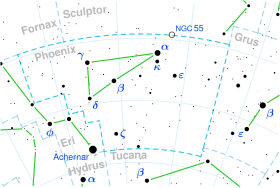| Observation data Epoch J2000 Equinox J2000 | |
|---|---|
| Constellation | Phoenix |
| Right ascension | 00h 43m 21.23841s[1] |
| Declination | −57° 27′ 47.0073″[1] |
| Apparent magnitude (V) | 4.36[2] |
| Characteristics | |
| Spectral type | A0IV[2] |
| U−B color index | -0.02[3] |
| B−V color index | +0.00[3] |
| Astrometry | |
| Radial velocity (Rv) | +7.70[4] km/s |
| Proper motion (μ) | RA: -5.07[1] mas/yr Dec.: +16.51[1] mas/yr |
| Parallax (π) | 13.24 ± 0.34 mas[1] |
| Distance | 246 ± 6 ly (76 ± 2 pc) |
| Absolute magnitude (MV) | -0.03[2] |
| Details | |
| Mass | 2.93[5] M☉ |
| Luminosity | 120[5] L☉ |
| Surface gravity (log g) | 3.85[6] cgs |
| Temperature | 9,822[6] K |
| Metallicity [Fe/H] | 0.00[7] dex |
| Rotational velocity (v sin i) | 124[5] km/s |
| Other designations | |
| Database references | |
| SIMBAD | data |
Eta Phoenicis (η Phe) is a class A0IV[2] (white subgiant) star in the constellation Phoenix. Its apparent magnitude is 4.36[2] and it is approximately 246 light years away based on parallax.[1]
Eta Phoenicis has two reported companions; in addition to a distant secondary, B, at magnitude 11.5 and separation 20", the primary has a reported companion Ab with an estimated separation of 6.8 AU, a period slightly longer than 10 years, a magnitude of 8.5, and a spectral type around G5V.[8][9] The primary is surrounded by an orbiting debris disk.[10]
- ^ a b c d e f Van Leeuwen, F. (2007). "Validation of the new Hipparcos reduction". Astronomy and Astrophysics. 474 (2): 653–664. arXiv:0708.1752. Bibcode:2007A&A...474..653V. doi:10.1051/0004-6361:20078357. S2CID 18759600. Vizier catalog entry
- ^ a b c d e Anderson, E.; Francis, Ch. (2012). "XHIP: An extended hipparcos compilation". Astronomy Letters. 38 (5): 331. arXiv:1108.4971. Bibcode:2012AstL...38..331A. doi:10.1134/S1063773712050015. S2CID 119257644. Vizier catalog entry
- ^ a b Mallama, A. (2014). "Sloan Magnitudes for the Brightest Stars". The Journal of the American Association of Variable Star Observers. 42 (2): 443. Bibcode:2014JAVSO..42..443M.Vizier catalog entry
- ^ Gontcharov, G. A. (2006). "Pulkovo Compilation of Radial Velocities for 35 495 Hipparcos stars in a common system". Astronomy Letters. 32 (11): 759–771. arXiv:1606.08053. Bibcode:2006AstL...32..759G. doi:10.1134/S1063773706110065. S2CID 119231169.
- ^ a b c Zorec, J.; Royer, F. (2012). "Rotational velocities of A-type stars". Astronomy & Astrophysics. 537: A120. arXiv:1201.2052. Bibcode:2012A&A...537A.120Z. doi:10.1051/0004-6361/201117691. S2CID 55586789. Vizier catalog entry
- ^ a b David, Trevor J.; Hillenbrand, Lynne A. (2015). "The Ages of Early-Type Stars: Strömgren Photometric Methods Calibrated, Validated, Tested, and Applied to Hosts and Prospective Hosts of Directly Imaged Exoplanets". The Astrophysical Journal. 804 (2): 146. arXiv:1501.03154. Bibcode:2015ApJ...804..146D. doi:10.1088/0004-637X/804/2/146. S2CID 33401607. Vizier catalog entry
- ^ Gontcharov, G. A. (2012). "Dependence of kinematics on the age of stars in the solar neighborhood". Astronomy Letters. 38 (12): 771–782. arXiv:1606.08814. Bibcode:2012AstL...38..771G. doi:10.1134/S1063773712120031. S2CID 118345778. Vizier catalog entry
- ^ Mason, Brian D.; Wycoff, Gary L.; Hartkopf, William I.; Douglass, Geoffrey G.; Worley, Charles E. (2001). "The 2001 US Naval Observatory Double Star CD-ROM. I. The Washington Double Star Catalog". The Astronomical Journal. 122 (6): 3466. Bibcode:2001AJ....122.3466M. doi:10.1086/323920. Vizier catalog entry
- ^ Marion, L.; Absil, O.; Ertel, S.; Le Bouquin, J.-B.; Augereau, J.-C.; Blind, N.; Defrère, D.; Lebreton, J.; Milli, J. (2014). "Searching for faint companions with VLTI/PIONIER". Astronomy & Astrophysics. 570: A127. arXiv:1409.6105. Bibcode:2014A&A...570A.127M. doi:10.1051/0004-6361/201424780. S2CID 8756486.
- ^ Cite error: The named reference
Marion2014was invoked but never defined (see the help page).
